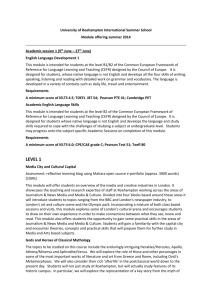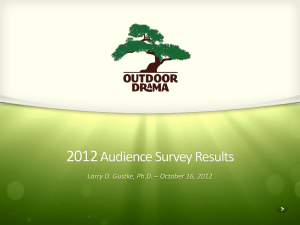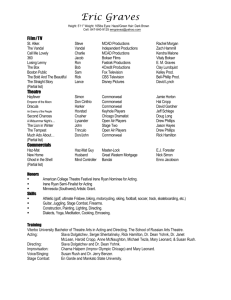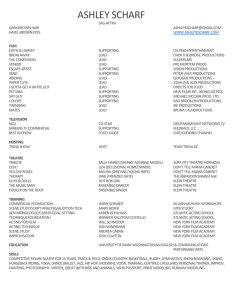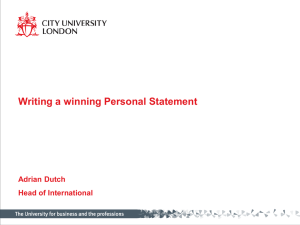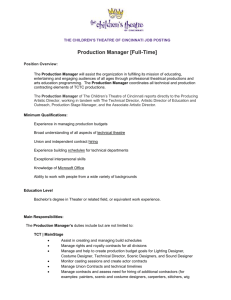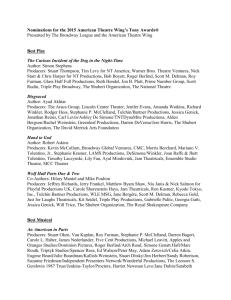Module offering summer 2013
advertisement
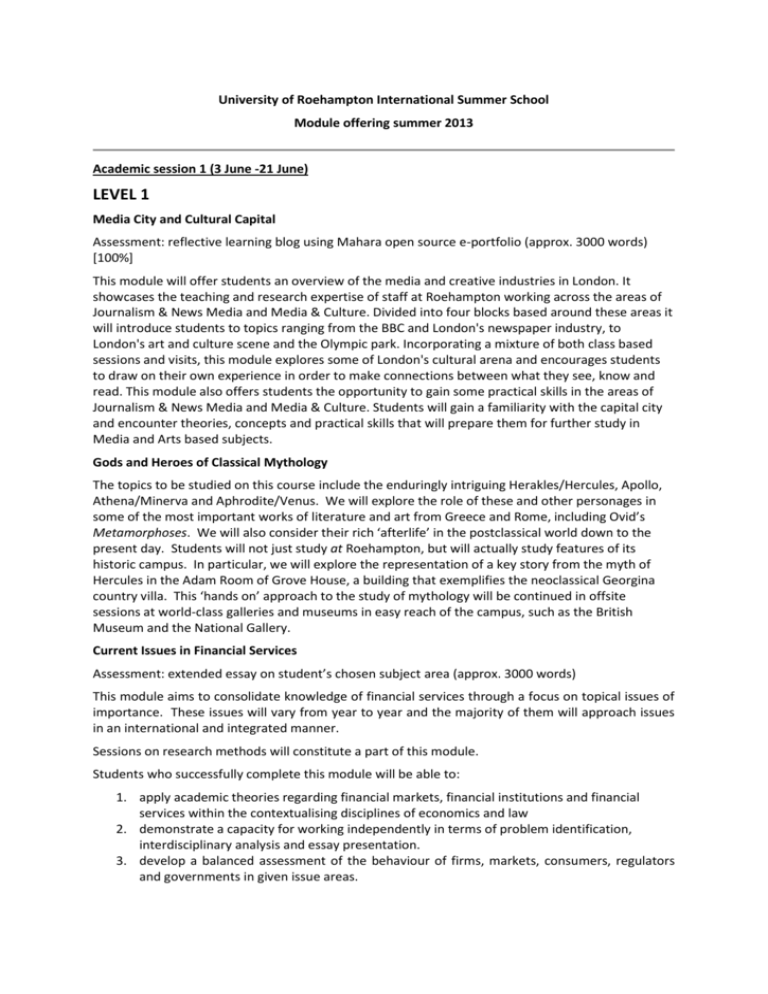
University of Roehampton International Summer School Module offering summer 2013 Academic session 1 (3 June -21 June) LEVEL 1 Media City and Cultural Capital Assessment: reflective learning blog using Mahara open source e-portfolio (approx. 3000 words) [100%] This module will offer students an overview of the media and creative industries in London. It showcases the teaching and research expertise of staff at Roehampton working across the areas of Journalism & News Media and Media & Culture. Divided into four blocks based around these areas it will introduce students to topics ranging from the BBC and London's newspaper industry, to London's art and culture scene and the Olympic park. Incorporating a mixture of both class based sessions and visits, this module explores some of London's cultural arena and encourages students to draw on their own experience in order to make connections between what they see, know and read. This module also offers students the opportunity to gain some practical skills in the areas of Journalism & News Media and Media & Culture. Students will gain a familiarity with the capital city and encounter theories, concepts and practical skills that will prepare them for further study in Media and Arts based subjects. Gods and Heroes of Classical Mythology The topics to be studied on this course include the enduringly intriguing Herakles/Hercules, Apollo, Athena/Minerva and Aphrodite/Venus. We will explore the role of these and other personages in some of the most important works of literature and art from Greece and Rome, including Ovid’s Metamorphoses. We will also consider their rich ‘afterlife’ in the postclassical world down to the present day. Students will not just study at Roehampton, but will actually study features of its historic campus. In particular, we will explore the representation of a key story from the myth of Hercules in the Adam Room of Grove House, a building that exemplifies the neoclassical Georgina country villa. This ‘hands on’ approach to the study of mythology will be continued in offsite sessions at world-class galleries and museums in easy reach of the campus, such as the British Museum and the National Gallery. Current Issues in Financial Services Assessment: extended essay on student’s chosen subject area (approx. 3000 words) This module aims to consolidate knowledge of financial services through a focus on topical issues of importance. These issues will vary from year to year and the majority of them will approach issues in an international and integrated manner. Sessions on research methods will constitute a part of this module. Students who successfully complete this module will be able to: 1. apply academic theories regarding financial markets, financial institutions and financial services within the contextualising disciplines of economics and law 2. demonstrate a capacity for working independently in terms of problem identification, interdisciplinary analysis and essay presentation. 3. develop a balanced assessment of the behaviour of firms, markets, consumers, regulators and governments in given issue areas. Introduction to the London Stage Assessment: coursework portfolio London is one of Europe’s most exciting theatrical cities with a range of productions on offer at any given time. are introduced to the wide diversity of theatre in London from the major subsidised companies, through the commercial West End to smaller fringe venues and productions. Weekly visits to new or recent events in the capital are introduced with a critical context and are discussed the following week within seminar groups. As part of the seminars, students will explore a range of strategies for analysing dramatic texts in production and reading live performance. Students will be introduced to a range of dramatic forms, conventions and aesthetics, which are employed on current London stages. Students will be encouraged to identify trends in productions and analyse the social and cultural contexts through which they are formed and constructed. Students will explore the relationship between contemporary theatre practices and specific periods of theatre history, i.e. the influence of earlier dramatic forms, conventions, contemporary stagings of classics, and contemporary responses and reworkings of the canonical texts/productions. The module will focus on plays which are currently running in repertory in the London theatre, the actual content varies from one term to another. Students will have an opportunity to visit the latest productions of major subsidised companies such as the National Theatre, the Royal Shakespeare Theatre and the Globe Theatre, new-writing theatres such as the Royal Court, through to smaller ‘fringe’ theatres and productions at alternative venues. Assessment: extended essay (approx. 2000 words) Academic session 2 (24th June – 12th July) LEVEL 1 Art in London Museums Assessment: illustrated essay (2000 words) [100%] The module will begin by looking at the historical development of museums from the random gathering of natural and man-made objects found in the Cabinet of Curiosities of the Renaissance to the institutional role played by modern and contemporary museums. We will have the opportunity to explore London’s collections for the purpose of contextualising and critically evaluating the cultural and historical value, purpose, educational role and key public function of different types of exhibiting space. Along with developing knowledge of the collections’ contents exhibits, the module will focus on ideas of collecting, curatorial knowledge and theories of display in the aim of deconstructing the cultural narratives and representations that each exhibiting space provides. Introduction to Applied Psychology Psychology is a fascinating discipline which helps us understand why we behave in the ways that we do. The aim of this introductory course is to provide you with a brief insight into the application of psychological theories and research into aspects of everyday life. Topics to be covered include: Humour, Crime, The Brain, Non-verbal Communication, Personality and Phobia. LEVEL 2 Spaces and Places Assessment: portfolio of studies [100%] This practical dance module will provide opportunities for students to broaden their choreographic experience through the development of dance material which is stimulated by locations in London. Students will have the opportunity to engage with the architecture and landscape of London and to respond creatively in dance in solo, duet and group tasks. All applicants must send in a recorded audition to demonstrate your skills and technique. Londonopolis Assessment: web/fieldtrip diary/blog (2000 words) [40%], essay (2000 words) [60%] This module will combine contemporary theories and debates on the condition of urban life in a global city with hands-on ethnographic, street-level perspective on urban social form experienced by students. The idea is to continuously relate theories from the fields of urban anthropology, sociology and urban studies with dynamic reality 'out-there' directly confronted by students and generate discussions among students on the interplay between culture and structure, economy and society, urban landscape and human behaviour. The methodological assumption behind the module is strictly anthropological - that students need to be 'immersed' in various aspects of London life, see things with their own eyes, analyse and critically evaluate their own assumptions against the backdrop of chaos and order of urban life in London. London is undoubtedly one of the global cities that offer a unique experience of social diversity. For many international students life in London is part of their education trajectory per se and this module aims at deepening this commonly held assumption through a study exploring various aspects and trends in contemporary global city. The proposed structure of the module will be divided between lectures/seminars/ethnographic debriefing sessions and field trips in 1:1 ratio (one trip, one session). The taught sessions will be divided into a taught theoretical background of the session and an 'ethnographic debriefing' session where notes, pictures, impressions from the field trip will be discussed and analysed.
